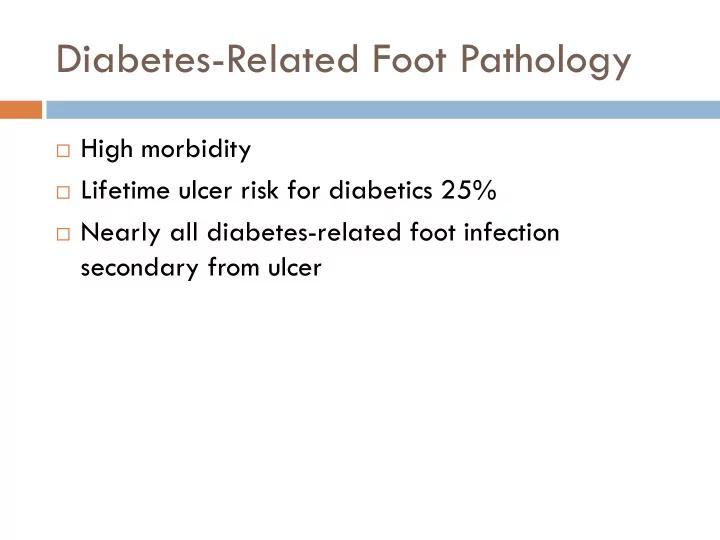

Diabetes-Related Foot Pathology High morbidity Lifetime ulcer risk for diabetics 25% Nearly all diabetes-related foot infection secondary from ulcer
Nothing To Disclosure
MRI Sensitivity & Specificity Osteomyelitis of Diabetic Feet 1995 (no Gd): 82% sensitivity, 80% specificity 1997 (with Gd): 90% sensitivity, 70% specificity no effect of Gd (disputes earlier data) 2007 (no Gd): 90% senisitivity, 83% specificity
MRI Primary Findings Marrow signal (HIGH STIR/T2 & LOW T1)* Gd Marrow enhancement Ulcer or sinus tract leading to bone with abnormal marrow signal Presence of abscess
MRI Secondary Signs Cellulitis Foreign body Periosteal reacton
Osteomyelitis vs. Neuropathic Charcot Osteomyelitis Neuropathic Charcot Marrow signal change Marrow signal change Multiple bones Single bone Periarticular & Diffuse infiltration subchondral Minimal deformity Deformity with bone debris Ulcer, sinus tract, abscess Edema but intact skin Wgt. bearing: fore/hind Non-wgt. bearing: foot midfoot
Location, Location, Location Neuroarthopathy (Charcot)--MIDFOOT: Tarsal-Tarsal Tarsometatarsal (TMT) Osteomyelitis FORE & HINDFOOT: Distal to tarsometatarsal Calcaneus Malleoli
Distal phalangeal osteomyelitis Low T1 signal
Distal phalangeal osteomyelitis High T2 signal
Distal phalangeal osteomyelitis Gd enhancement
Metatarsal head osteomyelitis with sinus tract
Forefoot osteomyelitis with contiguous abscess
Abscess and Osteomyelitis 20% of osteomyelitis are + for soft tissue abscess 100% correlation with osteomyelitis (same as sinus tract) Abscess more common in post surgical foot 50% of all abscesses in fore foot and are directly contiguous Mid/Hind foot abscess may be remote from site of osteomyelitis
Calcaneus osteomyelitis with sinus tract and abscess
Osteomyelitis with intramedullary bone abscess of talus
Osteomyelitis: confluent, geographic medullary distribution
No osteomyelitis: Ulcer with minimal subcortical T1/T2 signal
Osteomyelitis: ulcer with confluent abnomal T1 signal
No osteomyelitis: T1 “hazy” pattern
No osteomyelitis: T1 reticulated pattern
Neuropathic arthropathy of midfoot
Neuropathic arthropathy of midfoot
Neuropathic arthropathy with superimposed osteomyelitis
Bone Biopsy For histological proven osteomyelitis, positive rate of percutaneous biopsy: 50% 42% 34% (largest study)
Bone Biopsy Aspiration of > 2cc’s purulent fluid—83% positive osteomyelitis rate. Risk of seeding uninfected tissue. Utility of identifying an organism?
Recommend
More recommend